Foundations of Social Innovation: Climate Change Analysis and Policies
VerifiedAdded on 2023/01/17
|9
|2674
|47
Essay
AI Summary
This essay delves into the pressing issue of climate change, characterizing it as a "wicked problem" due to its complex nature and the varying perspectives on its causes and solutions. It explores the challenges in defining and addressing climate change, highlighting the disagreements among researchers and scholars. The essay then analyzes the Kyoto Protocol, a significant policy intervention aimed at reducing greenhouse gas emissions. It assesses the protocol's successes, such as the collective reduction of emissions by participating nations, and identifies its limitations, including the reliance on carbon credits and the failure to address all pollutants. Furthermore, the essay examines the unintended consequences of the Kyoto Protocol, such as inconsistencies in its legal texts and its focus on short-term solutions. The conclusion emphasizes the need for sustained behavioral changes and global cooperation to effectively tackle the multifaceted challenges of climate change.
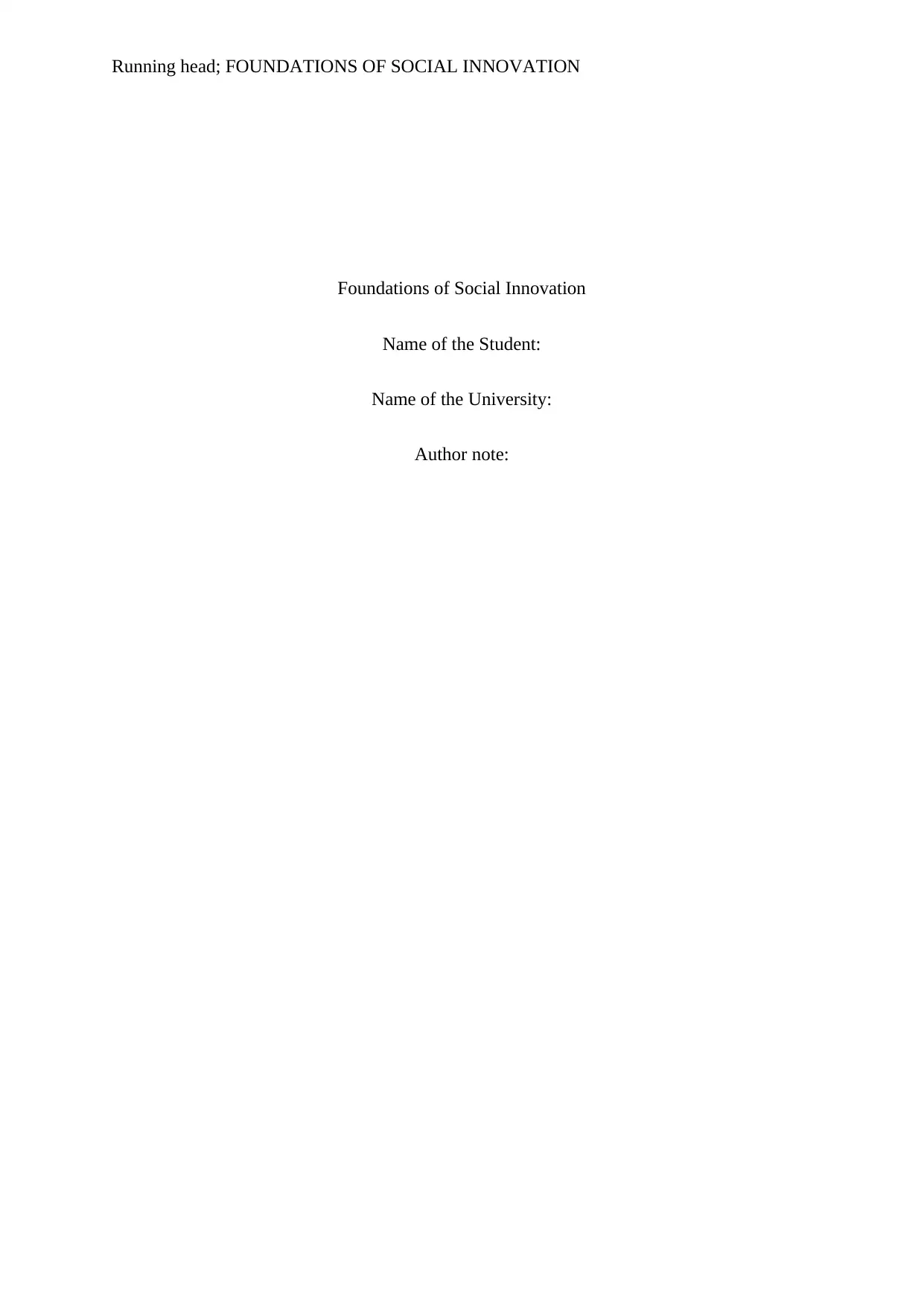
Running head; FOUNDATIONS OF SOCIAL INNOVATION
Foundations of Social Innovation
Name of the Student:
Name of the University:
Author note:
Foundations of Social Innovation
Name of the Student:
Name of the University:
Author note:
Paraphrase This Document
Need a fresh take? Get an instant paraphrase of this document with our AI Paraphraser
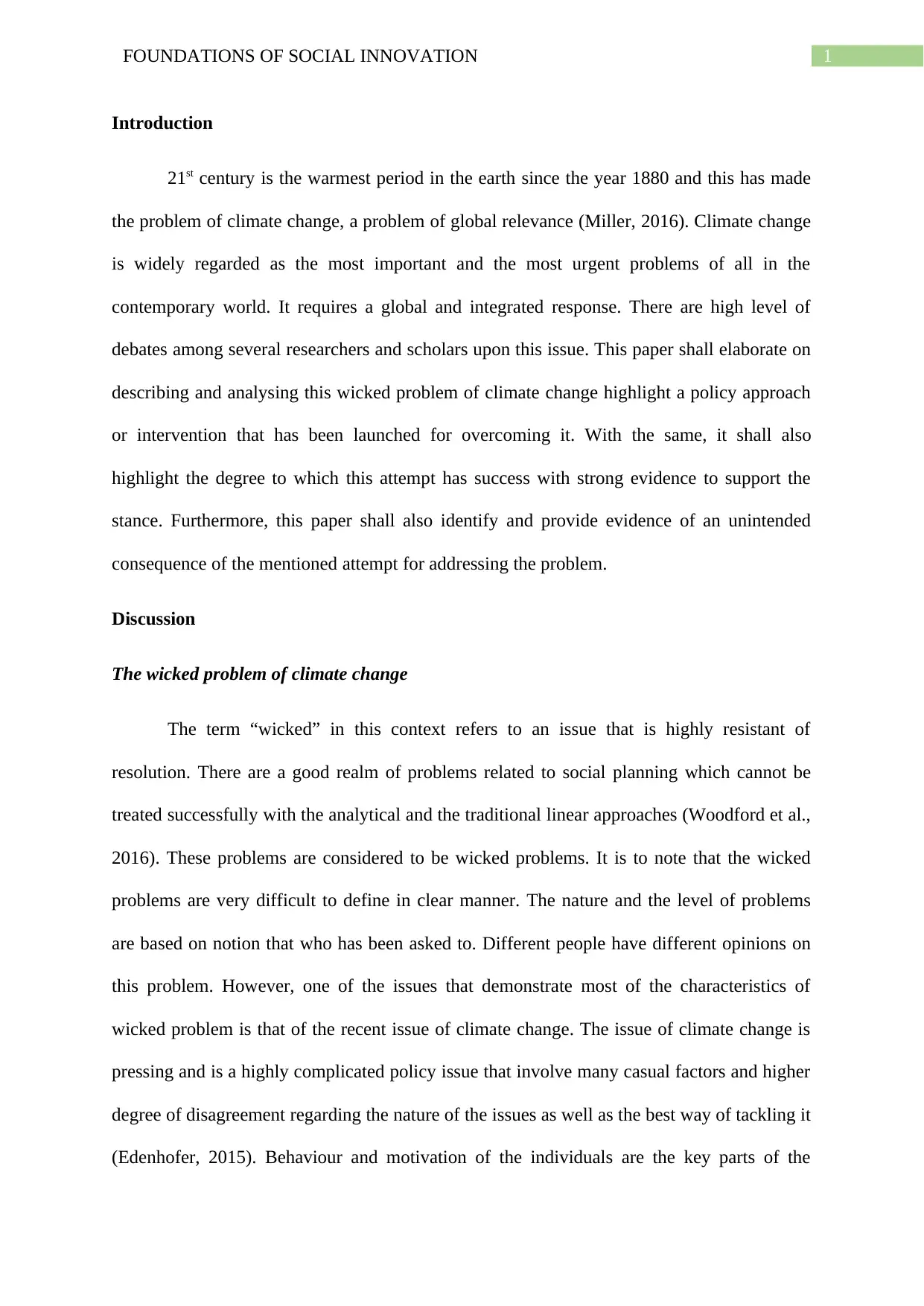
1FOUNDATIONS OF SOCIAL INNOVATION
Introduction
21st century is the warmest period in the earth since the year 1880 and this has made
the problem of climate change, a problem of global relevance (Miller, 2016). Climate change
is widely regarded as the most important and the most urgent problems of all in the
contemporary world. It requires a global and integrated response. There are high level of
debates among several researchers and scholars upon this issue. This paper shall elaborate on
describing and analysing this wicked problem of climate change highlight a policy approach
or intervention that has been launched for overcoming it. With the same, it shall also
highlight the degree to which this attempt has success with strong evidence to support the
stance. Furthermore, this paper shall also identify and provide evidence of an unintended
consequence of the mentioned attempt for addressing the problem.
Discussion
The wicked problem of climate change
The term “wicked” in this context refers to an issue that is highly resistant of
resolution. There are a good realm of problems related to social planning which cannot be
treated successfully with the analytical and the traditional linear approaches (Woodford et al.,
2016). These problems are considered to be wicked problems. It is to note that the wicked
problems are very difficult to define in clear manner. The nature and the level of problems
are based on notion that who has been asked to. Different people have different opinions on
this problem. However, one of the issues that demonstrate most of the characteristics of
wicked problem is that of the recent issue of climate change. The issue of climate change is
pressing and is a highly complicated policy issue that involve many casual factors and higher
degree of disagreement regarding the nature of the issues as well as the best way of tackling it
(Edenhofer, 2015). Behaviour and motivation of the individuals are the key parts of the
Introduction
21st century is the warmest period in the earth since the year 1880 and this has made
the problem of climate change, a problem of global relevance (Miller, 2016). Climate change
is widely regarded as the most important and the most urgent problems of all in the
contemporary world. It requires a global and integrated response. There are high level of
debates among several researchers and scholars upon this issue. This paper shall elaborate on
describing and analysing this wicked problem of climate change highlight a policy approach
or intervention that has been launched for overcoming it. With the same, it shall also
highlight the degree to which this attempt has success with strong evidence to support the
stance. Furthermore, this paper shall also identify and provide evidence of an unintended
consequence of the mentioned attempt for addressing the problem.
Discussion
The wicked problem of climate change
The term “wicked” in this context refers to an issue that is highly resistant of
resolution. There are a good realm of problems related to social planning which cannot be
treated successfully with the analytical and the traditional linear approaches (Woodford et al.,
2016). These problems are considered to be wicked problems. It is to note that the wicked
problems are very difficult to define in clear manner. The nature and the level of problems
are based on notion that who has been asked to. Different people have different opinions on
this problem. However, one of the issues that demonstrate most of the characteristics of
wicked problem is that of the recent issue of climate change. The issue of climate change is
pressing and is a highly complicated policy issue that involve many casual factors and higher
degree of disagreement regarding the nature of the issues as well as the best way of tackling it
(Edenhofer, 2015). Behaviour and motivation of the individuals are the key parts of the
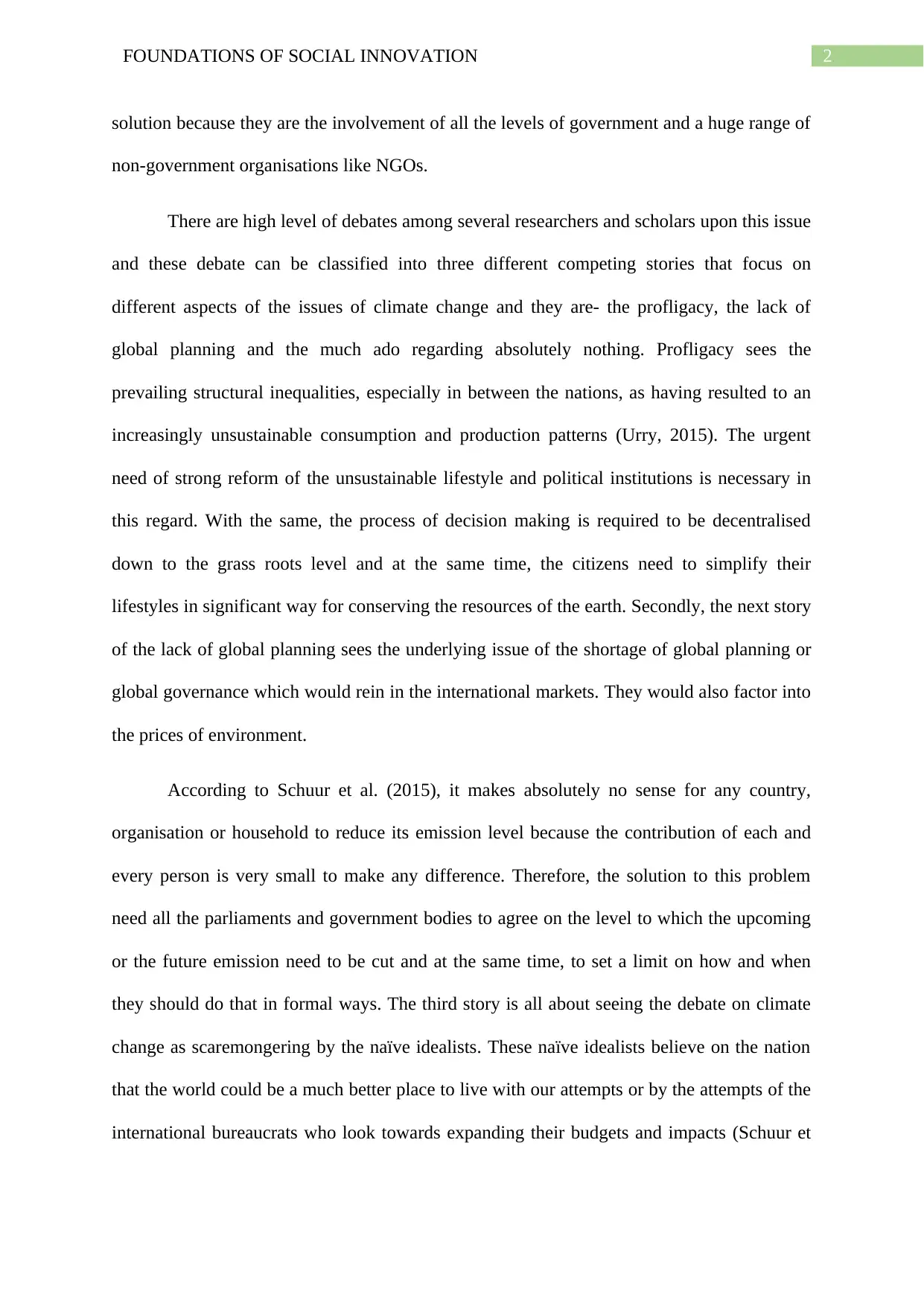
2FOUNDATIONS OF SOCIAL INNOVATION
solution because they are the involvement of all the levels of government and a huge range of
non-government organisations like NGOs.
There are high level of debates among several researchers and scholars upon this issue
and these debate can be classified into three different competing stories that focus on
different aspects of the issues of climate change and they are- the profligacy, the lack of
global planning and the much ado regarding absolutely nothing. Profligacy sees the
prevailing structural inequalities, especially in between the nations, as having resulted to an
increasingly unsustainable consumption and production patterns (Urry, 2015). The urgent
need of strong reform of the unsustainable lifestyle and political institutions is necessary in
this regard. With the same, the process of decision making is required to be decentralised
down to the grass roots level and at the same time, the citizens need to simplify their
lifestyles in significant way for conserving the resources of the earth. Secondly, the next story
of the lack of global planning sees the underlying issue of the shortage of global planning or
global governance which would rein in the international markets. They would also factor into
the prices of environment.
According to Schuur et al. (2015), it makes absolutely no sense for any country,
organisation or household to reduce its emission level because the contribution of each and
every person is very small to make any difference. Therefore, the solution to this problem
need all the parliaments and government bodies to agree on the level to which the upcoming
or the future emission need to be cut and at the same time, to set a limit on how and when
they should do that in formal ways. The third story is all about seeing the debate on climate
change as scaremongering by the naïve idealists. These naïve idealists believe on the nation
that the world could be a much better place to live with our attempts or by the attempts of the
international bureaucrats who look towards expanding their budgets and impacts (Schuur et
solution because they are the involvement of all the levels of government and a huge range of
non-government organisations like NGOs.
There are high level of debates among several researchers and scholars upon this issue
and these debate can be classified into three different competing stories that focus on
different aspects of the issues of climate change and they are- the profligacy, the lack of
global planning and the much ado regarding absolutely nothing. Profligacy sees the
prevailing structural inequalities, especially in between the nations, as having resulted to an
increasingly unsustainable consumption and production patterns (Urry, 2015). The urgent
need of strong reform of the unsustainable lifestyle and political institutions is necessary in
this regard. With the same, the process of decision making is required to be decentralised
down to the grass roots level and at the same time, the citizens need to simplify their
lifestyles in significant way for conserving the resources of the earth. Secondly, the next story
of the lack of global planning sees the underlying issue of the shortage of global planning or
global governance which would rein in the international markets. They would also factor into
the prices of environment.
According to Schuur et al. (2015), it makes absolutely no sense for any country,
organisation or household to reduce its emission level because the contribution of each and
every person is very small to make any difference. Therefore, the solution to this problem
need all the parliaments and government bodies to agree on the level to which the upcoming
or the future emission need to be cut and at the same time, to set a limit on how and when
they should do that in formal ways. The third story is all about seeing the debate on climate
change as scaremongering by the naïve idealists. These naïve idealists believe on the nation
that the world could be a much better place to live with our attempts or by the attempts of the
international bureaucrats who look towards expanding their budgets and impacts (Schuur et
⊘ This is a preview!⊘
Do you want full access?
Subscribe today to unlock all pages.

Trusted by 1+ million students worldwide
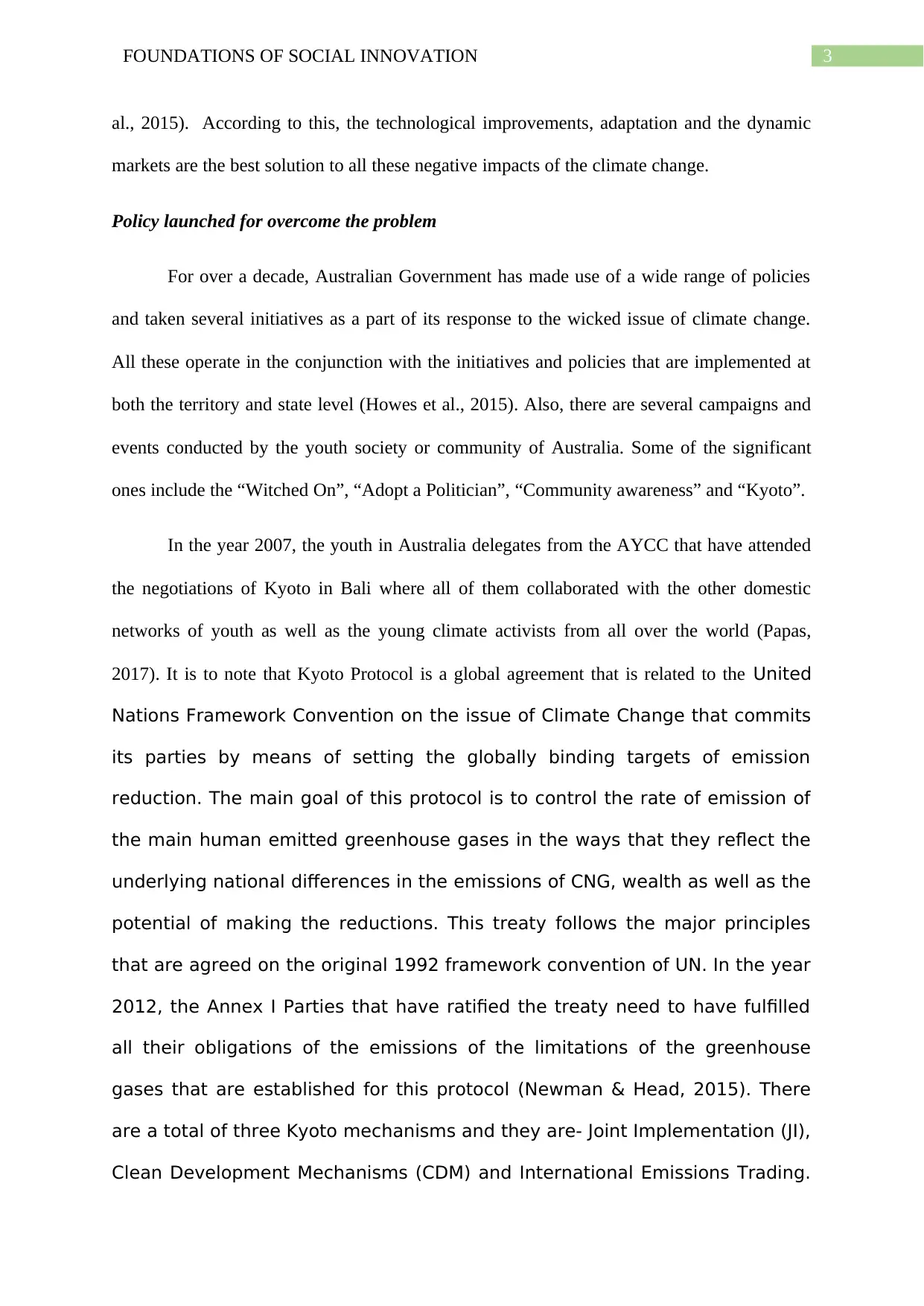
3FOUNDATIONS OF SOCIAL INNOVATION
al., 2015). According to this, the technological improvements, adaptation and the dynamic
markets are the best solution to all these negative impacts of the climate change.
Policy launched for overcome the problem
For over a decade, Australian Government has made use of a wide range of policies
and taken several initiatives as a part of its response to the wicked issue of climate change.
All these operate in the conjunction with the initiatives and policies that are implemented at
both the territory and state level (Howes et al., 2015). Also, there are several campaigns and
events conducted by the youth society or community of Australia. Some of the significant
ones include the “Witched On”, “Adopt a Politician”, “Community awareness” and “Kyoto”.
In the year 2007, the youth in Australia delegates from the AYCC that have attended
the negotiations of Kyoto in Bali where all of them collaborated with the other domestic
networks of youth as well as the young climate activists from all over the world (Papas,
2017). It is to note that Kyoto Protocol is a global agreement that is related to the United
Nations Framework Convention on the issue of Climate Change that commits
its parties by means of setting the globally binding targets of emission
reduction. The main goal of this protocol is to control the rate of emission of
the main human emitted greenhouse gases in the ways that they reflect the
underlying national differences in the emissions of CNG, wealth as well as the
potential of making the reductions. This treaty follows the major principles
that are agreed on the original 1992 framework convention of UN. In the year
2012, the Annex I Parties that have ratified the treaty need to have fulfilled
all their obligations of the emissions of the limitations of the greenhouse
gases that are established for this protocol (Newman & Head, 2015). There
are a total of three Kyoto mechanisms and they are- Joint Implementation (JI),
Clean Development Mechanisms (CDM) and International Emissions Trading.
al., 2015). According to this, the technological improvements, adaptation and the dynamic
markets are the best solution to all these negative impacts of the climate change.
Policy launched for overcome the problem
For over a decade, Australian Government has made use of a wide range of policies
and taken several initiatives as a part of its response to the wicked issue of climate change.
All these operate in the conjunction with the initiatives and policies that are implemented at
both the territory and state level (Howes et al., 2015). Also, there are several campaigns and
events conducted by the youth society or community of Australia. Some of the significant
ones include the “Witched On”, “Adopt a Politician”, “Community awareness” and “Kyoto”.
In the year 2007, the youth in Australia delegates from the AYCC that have attended
the negotiations of Kyoto in Bali where all of them collaborated with the other domestic
networks of youth as well as the young climate activists from all over the world (Papas,
2017). It is to note that Kyoto Protocol is a global agreement that is related to the United
Nations Framework Convention on the issue of Climate Change that commits
its parties by means of setting the globally binding targets of emission
reduction. The main goal of this protocol is to control the rate of emission of
the main human emitted greenhouse gases in the ways that they reflect the
underlying national differences in the emissions of CNG, wealth as well as the
potential of making the reductions. This treaty follows the major principles
that are agreed on the original 1992 framework convention of UN. In the year
2012, the Annex I Parties that have ratified the treaty need to have fulfilled
all their obligations of the emissions of the limitations of the greenhouse
gases that are established for this protocol (Newman & Head, 2015). There
are a total of three Kyoto mechanisms and they are- Joint Implementation (JI),
Clean Development Mechanisms (CDM) and International Emissions Trading.
Paraphrase This Document
Need a fresh take? Get an instant paraphrase of this document with our AI Paraphraser
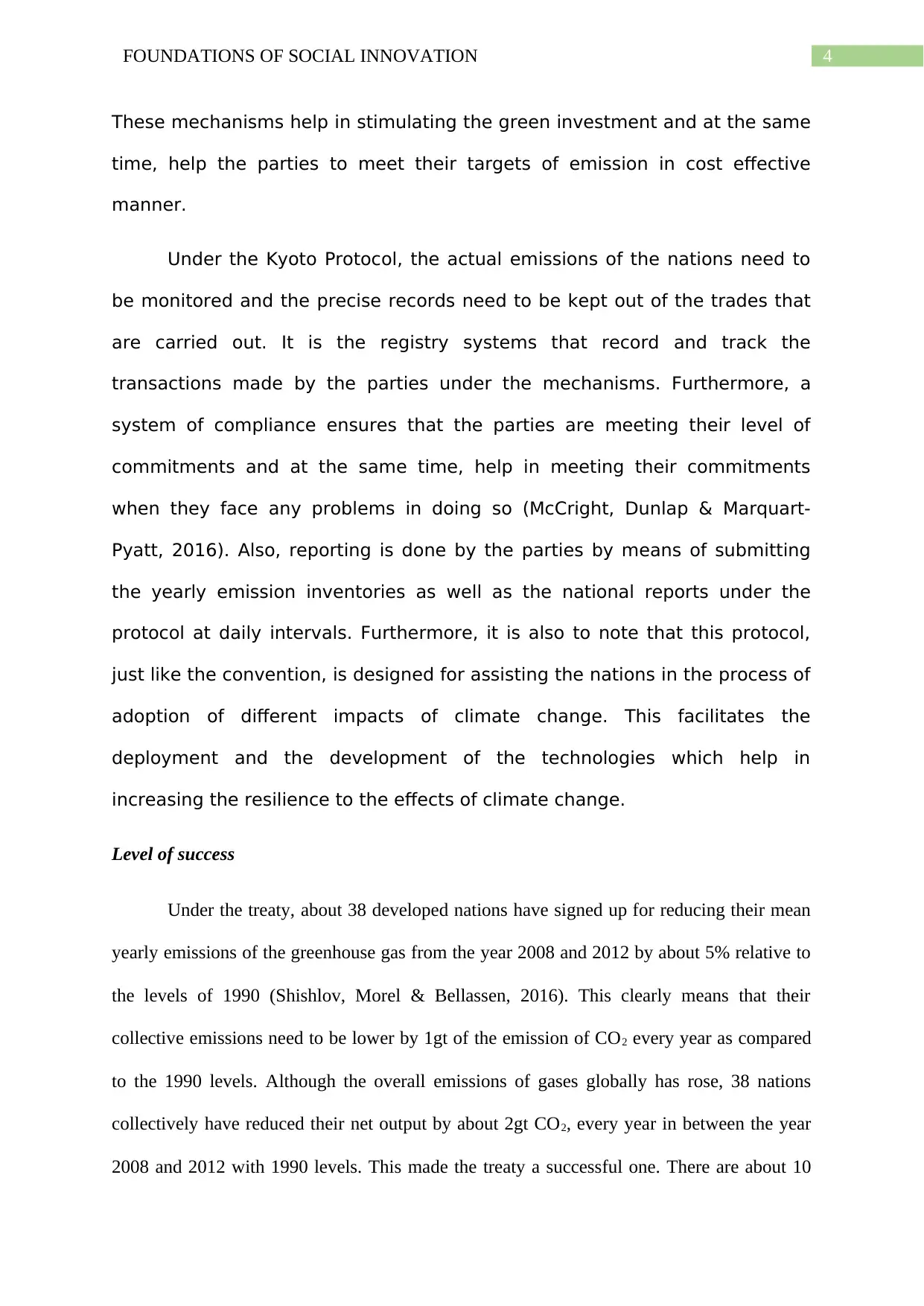
4FOUNDATIONS OF SOCIAL INNOVATION
These mechanisms help in stimulating the green investment and at the same
time, help the parties to meet their targets of emission in cost effective
manner.
Under the Kyoto Protocol, the actual emissions of the nations need to
be monitored and the precise records need to be kept out of the trades that
are carried out. It is the registry systems that record and track the
transactions made by the parties under the mechanisms. Furthermore, a
system of compliance ensures that the parties are meeting their level of
commitments and at the same time, help in meeting their commitments
when they face any problems in doing so (McCright, Dunlap & Marquart-
Pyatt, 2016). Also, reporting is done by the parties by means of submitting
the yearly emission inventories as well as the national reports under the
protocol at daily intervals. Furthermore, it is also to note that this protocol,
just like the convention, is designed for assisting the nations in the process of
adoption of different impacts of climate change. This facilitates the
deployment and the development of the technologies which help in
increasing the resilience to the effects of climate change.
Level of success
Under the treaty, about 38 developed nations have signed up for reducing their mean
yearly emissions of the greenhouse gas from the year 2008 and 2012 by about 5% relative to
the levels of 1990 (Shishlov, Morel & Bellassen, 2016). This clearly means that their
collective emissions need to be lower by 1gt of the emission of CO2 every year as compared
to the 1990 levels. Although the overall emissions of gases globally has rose, 38 nations
collectively have reduced their net output by about 2gt CO2, every year in between the year
2008 and 2012 with 1990 levels. This made the treaty a successful one. There are about 10
These mechanisms help in stimulating the green investment and at the same
time, help the parties to meet their targets of emission in cost effective
manner.
Under the Kyoto Protocol, the actual emissions of the nations need to
be monitored and the precise records need to be kept out of the trades that
are carried out. It is the registry systems that record and track the
transactions made by the parties under the mechanisms. Furthermore, a
system of compliance ensures that the parties are meeting their level of
commitments and at the same time, help in meeting their commitments
when they face any problems in doing so (McCright, Dunlap & Marquart-
Pyatt, 2016). Also, reporting is done by the parties by means of submitting
the yearly emission inventories as well as the national reports under the
protocol at daily intervals. Furthermore, it is also to note that this protocol,
just like the convention, is designed for assisting the nations in the process of
adoption of different impacts of climate change. This facilitates the
deployment and the development of the technologies which help in
increasing the resilience to the effects of climate change.
Level of success
Under the treaty, about 38 developed nations have signed up for reducing their mean
yearly emissions of the greenhouse gas from the year 2008 and 2012 by about 5% relative to
the levels of 1990 (Shishlov, Morel & Bellassen, 2016). This clearly means that their
collective emissions need to be lower by 1gt of the emission of CO2 every year as compared
to the 1990 levels. Although the overall emissions of gases globally has rose, 38 nations
collectively have reduced their net output by about 2gt CO2, every year in between the year
2008 and 2012 with 1990 levels. This made the treaty a successful one. There are about 10
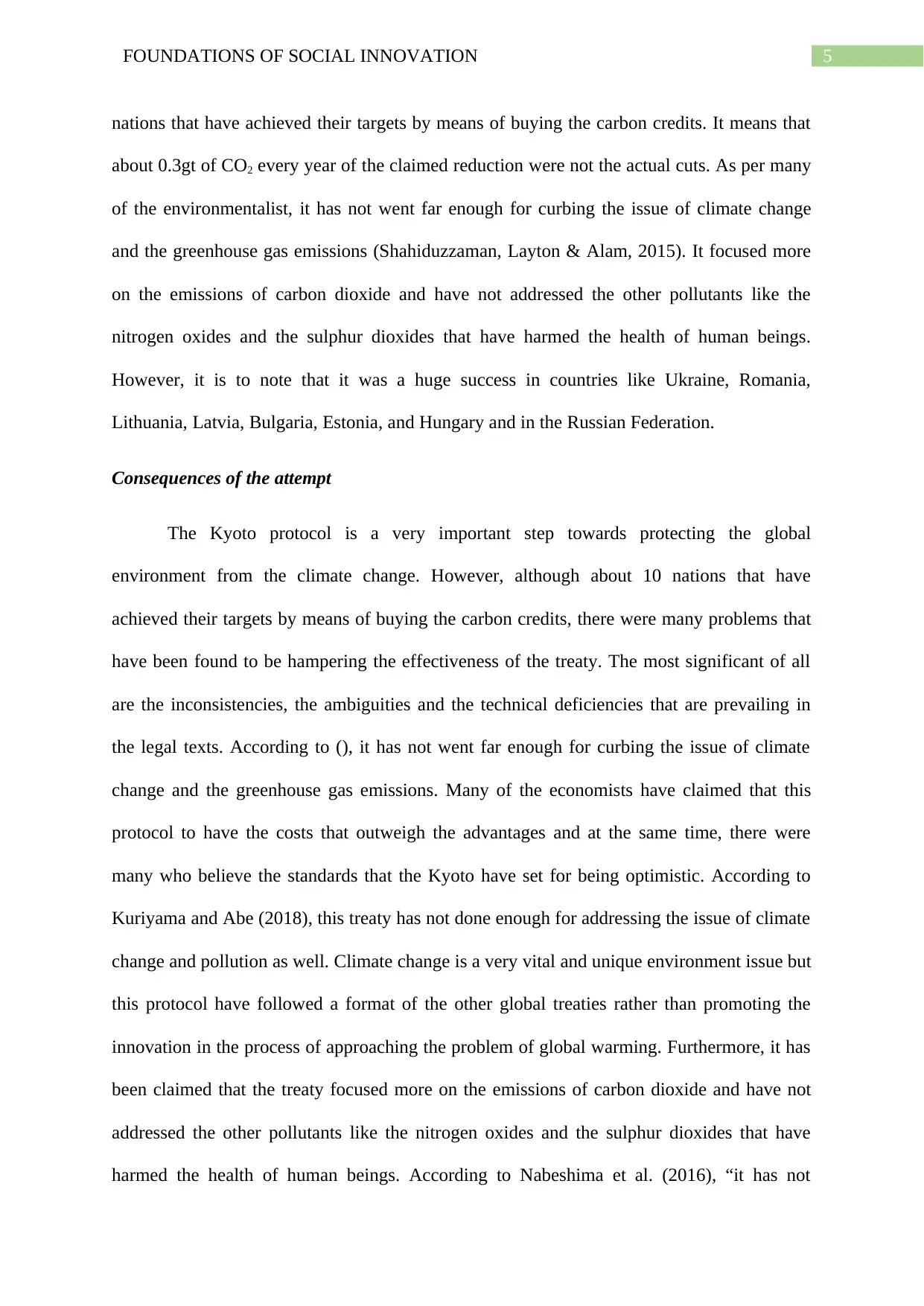
5FOUNDATIONS OF SOCIAL INNOVATION
nations that have achieved their targets by means of buying the carbon credits. It means that
about 0.3gt of CO2 every year of the claimed reduction were not the actual cuts. As per many
of the environmentalist, it has not went far enough for curbing the issue of climate change
and the greenhouse gas emissions (Shahiduzzaman, Layton & Alam, 2015). It focused more
on the emissions of carbon dioxide and have not addressed the other pollutants like the
nitrogen oxides and the sulphur dioxides that have harmed the health of human beings.
However, it is to note that it was a huge success in countries like Ukraine, Romania,
Lithuania, Latvia, Bulgaria, Estonia, and Hungary and in the Russian Federation.
Consequences of the attempt
The Kyoto protocol is a very important step towards protecting the global
environment from the climate change. However, although about 10 nations that have
achieved their targets by means of buying the carbon credits, there were many problems that
have been found to be hampering the effectiveness of the treaty. The most significant of all
are the inconsistencies, the ambiguities and the technical deficiencies that are prevailing in
the legal texts. According to (), it has not went far enough for curbing the issue of climate
change and the greenhouse gas emissions. Many of the economists have claimed that this
protocol to have the costs that outweigh the advantages and at the same time, there were
many who believe the standards that the Kyoto have set for being optimistic. According to
Kuriyama and Abe (2018), this treaty has not done enough for addressing the issue of climate
change and pollution as well. Climate change is a very vital and unique environment issue but
this protocol have followed a format of the other global treaties rather than promoting the
innovation in the process of approaching the problem of global warming. Furthermore, it has
been claimed that the treaty focused more on the emissions of carbon dioxide and have not
addressed the other pollutants like the nitrogen oxides and the sulphur dioxides that have
harmed the health of human beings. According to Nabeshima et al. (2016), “it has not
nations that have achieved their targets by means of buying the carbon credits. It means that
about 0.3gt of CO2 every year of the claimed reduction were not the actual cuts. As per many
of the environmentalist, it has not went far enough for curbing the issue of climate change
and the greenhouse gas emissions (Shahiduzzaman, Layton & Alam, 2015). It focused more
on the emissions of carbon dioxide and have not addressed the other pollutants like the
nitrogen oxides and the sulphur dioxides that have harmed the health of human beings.
However, it is to note that it was a huge success in countries like Ukraine, Romania,
Lithuania, Latvia, Bulgaria, Estonia, and Hungary and in the Russian Federation.
Consequences of the attempt
The Kyoto protocol is a very important step towards protecting the global
environment from the climate change. However, although about 10 nations that have
achieved their targets by means of buying the carbon credits, there were many problems that
have been found to be hampering the effectiveness of the treaty. The most significant of all
are the inconsistencies, the ambiguities and the technical deficiencies that are prevailing in
the legal texts. According to (), it has not went far enough for curbing the issue of climate
change and the greenhouse gas emissions. Many of the economists have claimed that this
protocol to have the costs that outweigh the advantages and at the same time, there were
many who believe the standards that the Kyoto have set for being optimistic. According to
Kuriyama and Abe (2018), this treaty has not done enough for addressing the issue of climate
change and pollution as well. Climate change is a very vital and unique environment issue but
this protocol have followed a format of the other global treaties rather than promoting the
innovation in the process of approaching the problem of global warming. Furthermore, it has
been claimed that the treaty focused more on the emissions of carbon dioxide and have not
addressed the other pollutants like the nitrogen oxides and the sulphur dioxides that have
harmed the health of human beings. According to Nabeshima et al. (2016), “it has not
⊘ This is a preview!⊘
Do you want full access?
Subscribe today to unlock all pages.

Trusted by 1+ million students worldwide
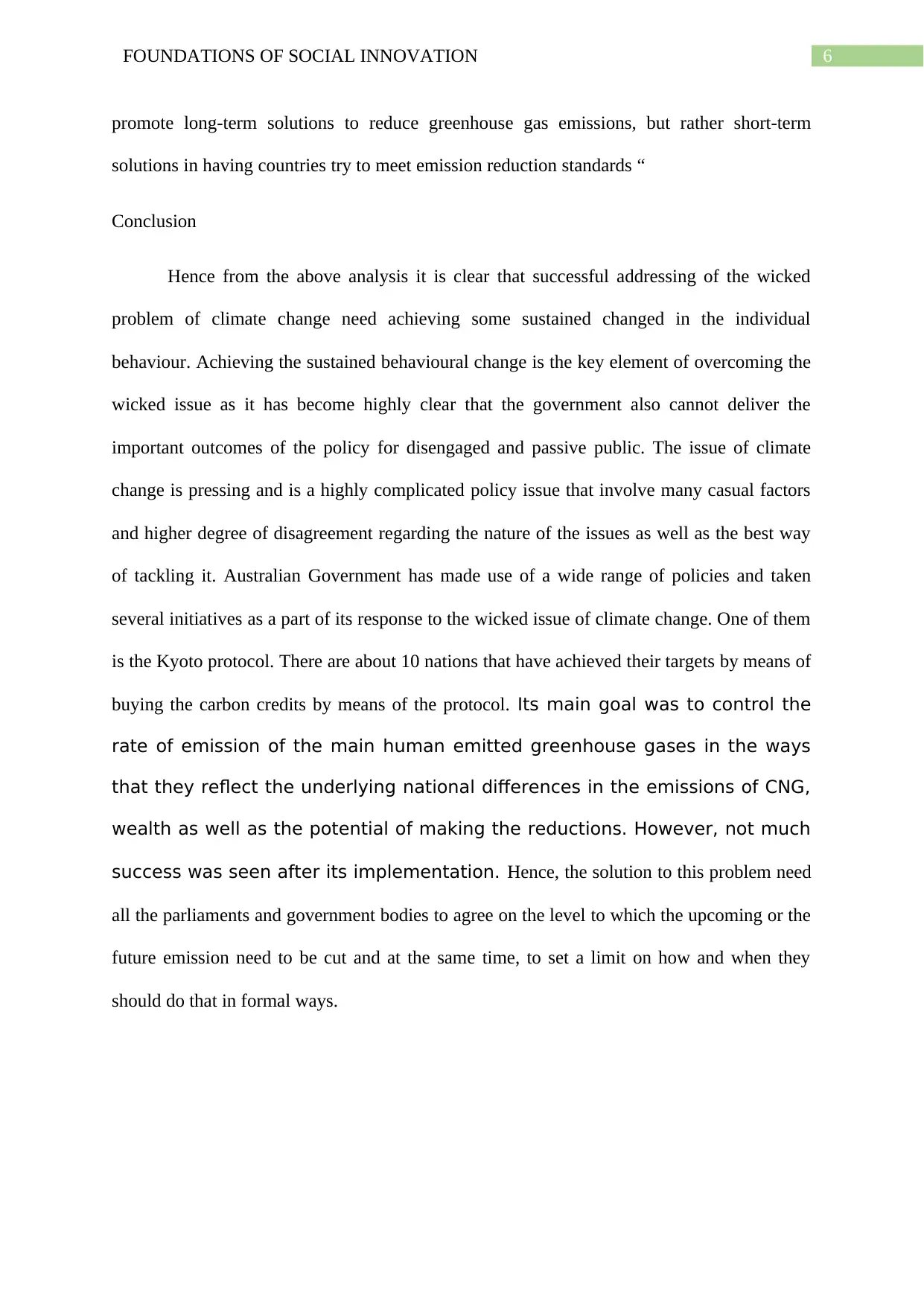
6FOUNDATIONS OF SOCIAL INNOVATION
promote long-term solutions to reduce greenhouse gas emissions, but rather short-term
solutions in having countries try to meet emission reduction standards “
Conclusion
Hence from the above analysis it is clear that successful addressing of the wicked
problem of climate change need achieving some sustained changed in the individual
behaviour. Achieving the sustained behavioural change is the key element of overcoming the
wicked issue as it has become highly clear that the government also cannot deliver the
important outcomes of the policy for disengaged and passive public. The issue of climate
change is pressing and is a highly complicated policy issue that involve many casual factors
and higher degree of disagreement regarding the nature of the issues as well as the best way
of tackling it. Australian Government has made use of a wide range of policies and taken
several initiatives as a part of its response to the wicked issue of climate change. One of them
is the Kyoto protocol. There are about 10 nations that have achieved their targets by means of
buying the carbon credits by means of the protocol. Its main goal was to control the
rate of emission of the main human emitted greenhouse gases in the ways
that they reflect the underlying national differences in the emissions of CNG,
wealth as well as the potential of making the reductions. However, not much
success was seen after its implementation. Hence, the solution to this problem need
all the parliaments and government bodies to agree on the level to which the upcoming or the
future emission need to be cut and at the same time, to set a limit on how and when they
should do that in formal ways.
promote long-term solutions to reduce greenhouse gas emissions, but rather short-term
solutions in having countries try to meet emission reduction standards “
Conclusion
Hence from the above analysis it is clear that successful addressing of the wicked
problem of climate change need achieving some sustained changed in the individual
behaviour. Achieving the sustained behavioural change is the key element of overcoming the
wicked issue as it has become highly clear that the government also cannot deliver the
important outcomes of the policy for disengaged and passive public. The issue of climate
change is pressing and is a highly complicated policy issue that involve many casual factors
and higher degree of disagreement regarding the nature of the issues as well as the best way
of tackling it. Australian Government has made use of a wide range of policies and taken
several initiatives as a part of its response to the wicked issue of climate change. One of them
is the Kyoto protocol. There are about 10 nations that have achieved their targets by means of
buying the carbon credits by means of the protocol. Its main goal was to control the
rate of emission of the main human emitted greenhouse gases in the ways
that they reflect the underlying national differences in the emissions of CNG,
wealth as well as the potential of making the reductions. However, not much
success was seen after its implementation. Hence, the solution to this problem need
all the parliaments and government bodies to agree on the level to which the upcoming or the
future emission need to be cut and at the same time, to set a limit on how and when they
should do that in formal ways.
Paraphrase This Document
Need a fresh take? Get an instant paraphrase of this document with our AI Paraphraser
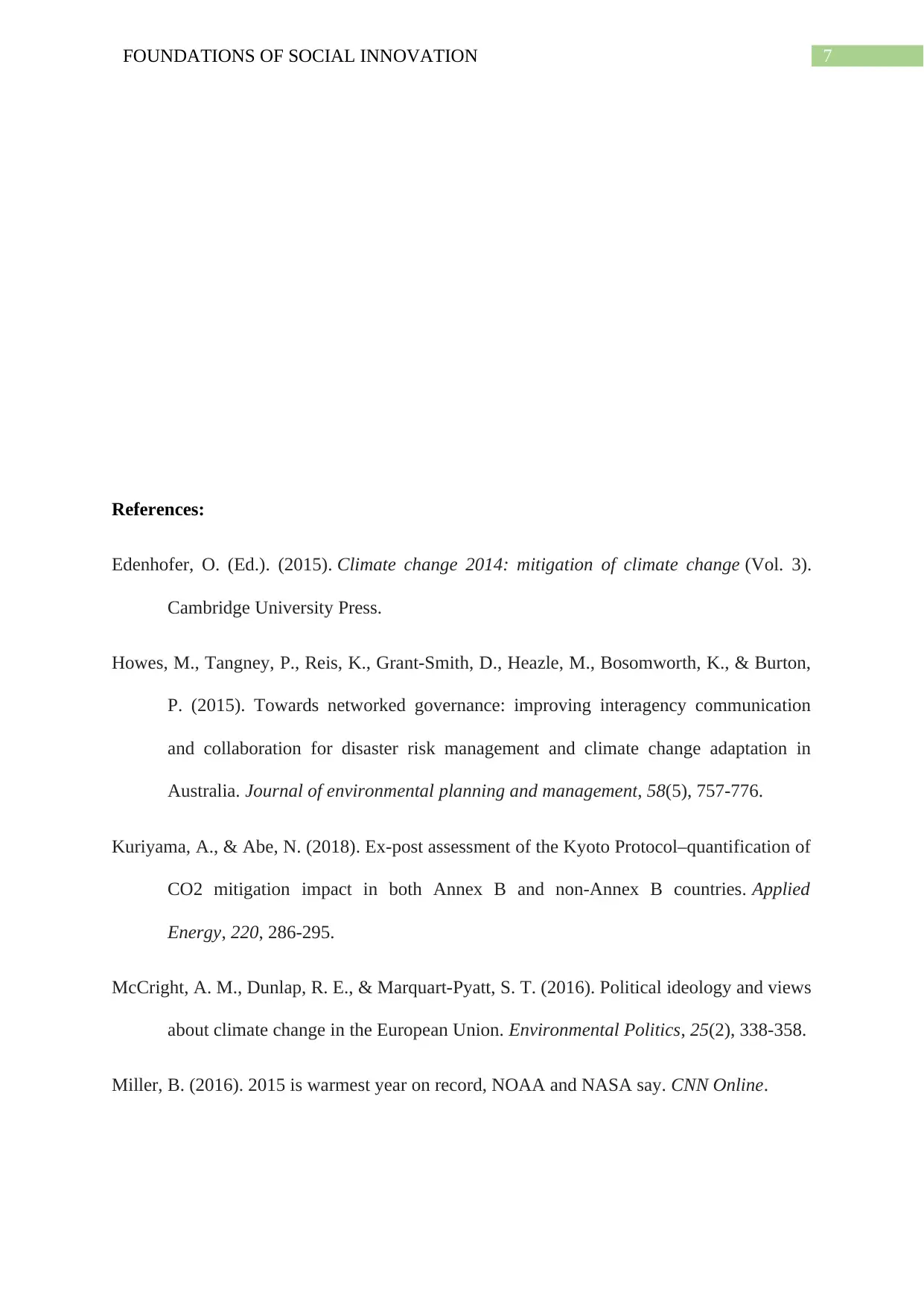
7FOUNDATIONS OF SOCIAL INNOVATION
References:
Edenhofer, O. (Ed.). (2015). Climate change 2014: mitigation of climate change (Vol. 3).
Cambridge University Press.
Howes, M., Tangney, P., Reis, K., Grant-Smith, D., Heazle, M., Bosomworth, K., & Burton,
P. (2015). Towards networked governance: improving interagency communication
and collaboration for disaster risk management and climate change adaptation in
Australia. Journal of environmental planning and management, 58(5), 757-776.
Kuriyama, A., & Abe, N. (2018). Ex-post assessment of the Kyoto Protocol–quantification of
CO2 mitigation impact in both Annex B and non-Annex B countries. Applied
Energy, 220, 286-295.
McCright, A. M., Dunlap, R. E., & Marquart-Pyatt, S. T. (2016). Political ideology and views
about climate change in the European Union. Environmental Politics, 25(2), 338-358.
Miller, B. (2016). 2015 is warmest year on record, NOAA and NASA say. CNN Online.
References:
Edenhofer, O. (Ed.). (2015). Climate change 2014: mitigation of climate change (Vol. 3).
Cambridge University Press.
Howes, M., Tangney, P., Reis, K., Grant-Smith, D., Heazle, M., Bosomworth, K., & Burton,
P. (2015). Towards networked governance: improving interagency communication
and collaboration for disaster risk management and climate change adaptation in
Australia. Journal of environmental planning and management, 58(5), 757-776.
Kuriyama, A., & Abe, N. (2018). Ex-post assessment of the Kyoto Protocol–quantification of
CO2 mitigation impact in both Annex B and non-Annex B countries. Applied
Energy, 220, 286-295.
McCright, A. M., Dunlap, R. E., & Marquart-Pyatt, S. T. (2016). Political ideology and views
about climate change in the European Union. Environmental Politics, 25(2), 338-358.
Miller, B. (2016). 2015 is warmest year on record, NOAA and NASA say. CNN Online.
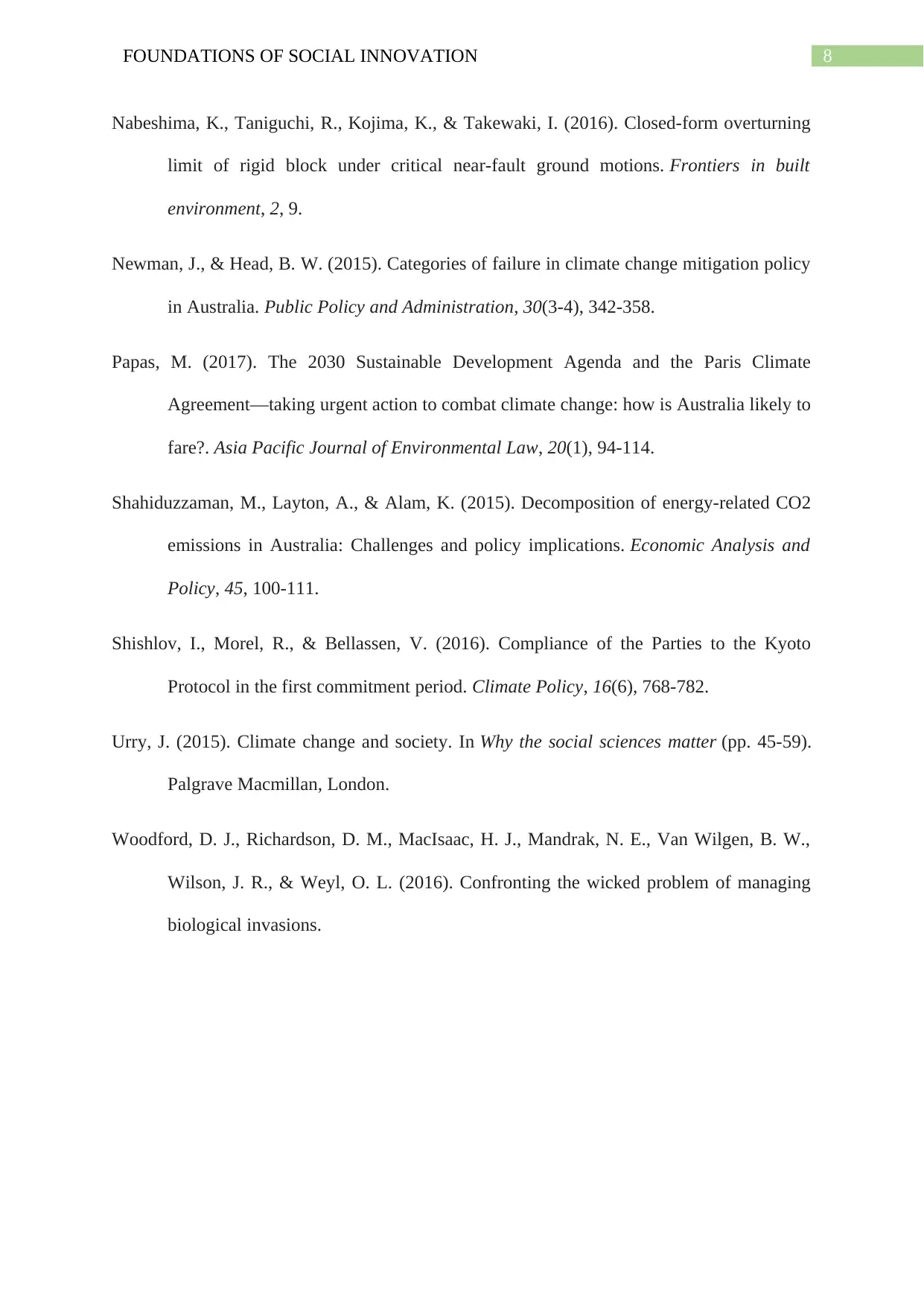
8FOUNDATIONS OF SOCIAL INNOVATION
Nabeshima, K., Taniguchi, R., Kojima, K., & Takewaki, I. (2016). Closed-form overturning
limit of rigid block under critical near-fault ground motions. Frontiers in built
environment, 2, 9.
Newman, J., & Head, B. W. (2015). Categories of failure in climate change mitigation policy
in Australia. Public Policy and Administration, 30(3-4), 342-358.
Papas, M. (2017). The 2030 Sustainable Development Agenda and the Paris Climate
Agreement—taking urgent action to combat climate change: how is Australia likely to
fare?. Asia Pacific Journal of Environmental Law, 20(1), 94-114.
Shahiduzzaman, M., Layton, A., & Alam, K. (2015). Decomposition of energy-related CO2
emissions in Australia: Challenges and policy implications. Economic Analysis and
Policy, 45, 100-111.
Shishlov, I., Morel, R., & Bellassen, V. (2016). Compliance of the Parties to the Kyoto
Protocol in the first commitment period. Climate Policy, 16(6), 768-782.
Urry, J. (2015). Climate change and society. In Why the social sciences matter (pp. 45-59).
Palgrave Macmillan, London.
Woodford, D. J., Richardson, D. M., MacIsaac, H. J., Mandrak, N. E., Van Wilgen, B. W.,
Wilson, J. R., & Weyl, O. L. (2016). Confronting the wicked problem of managing
biological invasions.
Nabeshima, K., Taniguchi, R., Kojima, K., & Takewaki, I. (2016). Closed-form overturning
limit of rigid block under critical near-fault ground motions. Frontiers in built
environment, 2, 9.
Newman, J., & Head, B. W. (2015). Categories of failure in climate change mitigation policy
in Australia. Public Policy and Administration, 30(3-4), 342-358.
Papas, M. (2017). The 2030 Sustainable Development Agenda and the Paris Climate
Agreement—taking urgent action to combat climate change: how is Australia likely to
fare?. Asia Pacific Journal of Environmental Law, 20(1), 94-114.
Shahiduzzaman, M., Layton, A., & Alam, K. (2015). Decomposition of energy-related CO2
emissions in Australia: Challenges and policy implications. Economic Analysis and
Policy, 45, 100-111.
Shishlov, I., Morel, R., & Bellassen, V. (2016). Compliance of the Parties to the Kyoto
Protocol in the first commitment period. Climate Policy, 16(6), 768-782.
Urry, J. (2015). Climate change and society. In Why the social sciences matter (pp. 45-59).
Palgrave Macmillan, London.
Woodford, D. J., Richardson, D. M., MacIsaac, H. J., Mandrak, N. E., Van Wilgen, B. W.,
Wilson, J. R., & Weyl, O. L. (2016). Confronting the wicked problem of managing
biological invasions.
⊘ This is a preview!⊘
Do you want full access?
Subscribe today to unlock all pages.

Trusted by 1+ million students worldwide
1 out of 9
Your All-in-One AI-Powered Toolkit for Academic Success.
+13062052269
info@desklib.com
Available 24*7 on WhatsApp / Email
![[object Object]](/_next/static/media/star-bottom.7253800d.svg)
Unlock your academic potential
Copyright © 2020–2025 A2Z Services. All Rights Reserved. Developed and managed by ZUCOL.